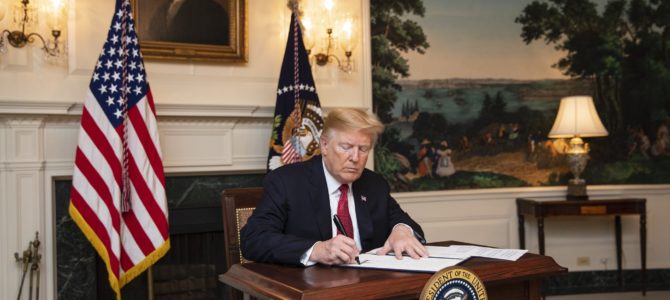Ukrainian officials did not think that President Trump was using U.S. aid as a bargaining chip when he and Ukrainian President Volodymyr Zelensky spoke in July. According to BuzzFeed News, at the time of the infamous phone call now used as the basis for Democrats’ latest impeachment efforts, the Ukrainian president thought U.S. aid was already on its way. This aligns with what The New York Times reported last week in regards to the Zelensky government not thinking aid might be withheld.
Two Ukrainian officials and one U.S. official shared that at the time of the July 25 phone call between Trump and Zelensky, the Ukrainian government was still expecting aid from the United States. They had no idea that the aid was being withheld and were “stumped” to hear nearly a month after the call that it had been suspended.
This contradicts the Democratic narrative that Trump was engaging in an insidious quid pro quo by withholding military aid from Ukraine to compel them to investigate former vice president and 2020 Democratic contender Joe Biden, among other requests.
According to BuzzFeed, Ukrainian officials were expecting $250 million in aid from the Pentagon and $141 million from the State Department. They learned of the suspended aid in a letter from Ukraine’s embassy in Washington nearly a month after the phone call. Although Trump had ordered the aid to be withheld in mid-July before the July 25 phone call, Zelensky has previously stated that he was not told why.
As political pundit Ben Shapiro has pointed out, it is impossible to have a quid pro quo if the other side does not know it is being threatened. Without that, what would otherwise compel Ukraine to allegedly perform a given set of actions on Trump’s behalf?
Even the whistleblower’s complaint expressed skepticism as to whether Ukrainian officials knew that aid was being withheld: “As of early August, I heard from U.S. officials that some Ukrainian officials were aware that U.S. aid might be in jeopardy, but I do not know how or when they learned of it.” Believing both the reporting of BuzzFeed and The New York Times would mean that the whistleblower’s sources about the knowledge of Ukrainian officials were not reliable.
Indeed, knowledge of withheld aid is a fairly dramatic error, given such knowledge initially served as the basis of the quid pro allegation at the heart of Democrats’ claims of corruption. Now, Democrats have walked back their claims, with some attempting to fashion a circumstantial “quid pro quo” while others, such as House Speaker Nancy Pelosi, tacitly suggesting no quid pro quo is needed to impeach President Trump.
But it doesn’t stop with the Democrats. ABC News actually mislabeled a former Ukrainian advisor as a current advisor to President Zelensky. This error was magnified when the advisor alleged that Trump refused to meet with the Ukrainian president unless the Biden question was brought up. Not only was this advisor not currently serving in Zelensky’s administration, but he was not doing so at the time of the July phone call, either.
ABC was forced to issue a correction, but it had nonetheless established the false narrative of a quid pro quo. At a time when journalism has increasingly become defined by the mantra of “publish now, factcheck later,” it is hard not to wonder why all the errors seem to transpire in one direction and what kind of damage such reporting does to public’s ability to obtain and retain the truth.
Indeed, the machinations of a quid pro quo seem increasingly to be a concoction of the media and House Democrats in order to justify putting the country through the trauma of impeachment proceedings, despite the lack of evidence to bolster the anti-Trump whistleblower’s allegations.









